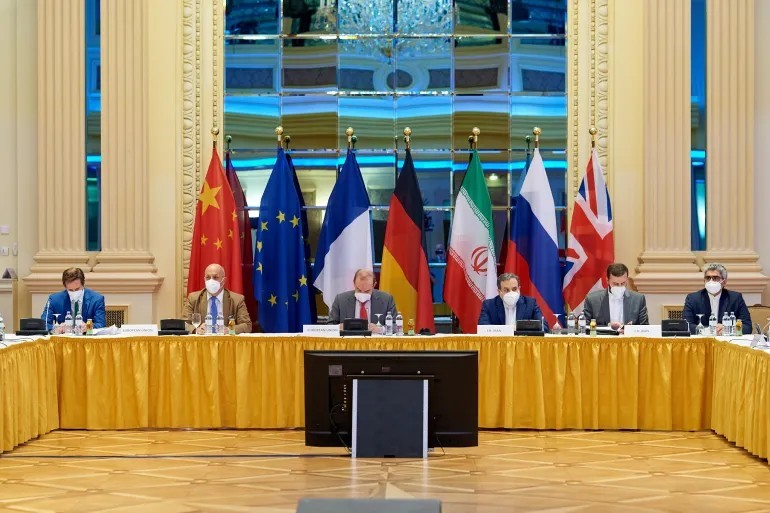Renewed Tensions Over Iran’s Nuclear Programme Escalate
Renewed Tensions Over Iran’s Nuclear Programme Escalate
Why in the News?
Amid ongoing US-Iran nuclear negotiations, the IAEA’s resolution against Iran and Israel’s threats of military action have sharply heightened Middle East tensions, raising fears of escalation and jeopardising the fragile diplomatic process over the Iran nuclear programme. The situation has reignited concerns about the potential development of an Iran nuclear bomb and the broader question of which countries have nuclear weapons in the region, including the historical context of atom bombs.
Triggering Events and IAEA Resolution:
- Israel signalled readiness for a military strike on Iran country, prompting the US to issue travel advisories.
- The IAEA Board of Governors, acting as the nuclear watchdog, passed a UN resolution stating Iran was in non-compliance with its nuclear obligations for the first time in 20 years.
- Iran faces allegations of secret nuclear activities at three undeclared sites, with inspectors finding uranium traces, raising concerns about undeclared nuclear material and potential development of atom bombs.
- European nations (UK, France, Germany) may initiate “snapback sanctions” under the 2015 nuclear deal, also known as the Joint Comprehensive Plan of Action (JCPOA), which expires in October 2025.
- Iran reacted by threatening withdrawal from the Treaty on the Non-Proliferation of Nuclear Weapons (NPT) and announced a new uranium enrichment site.
Nuclear Negotiations and Red Lines
- Sixth round of US-Iran nuclear talks set for Muscat; key issue is uranium enrichment and the potential production of weapons-grade uranium, reminiscent of efforts to create the first atomic bomb.
- US offers temporary enrichment with future supply from regional consortium, rejected by Iran.
- Iran insists on sovereign right to enrich uranium, offering transparency in exchange for sanctions relief regarding its nuclear facilities.
- Israel demands dismantling of Iran’s nuclear infrastructure under American supervision—a demand outside its formal role in talks, citing Israeli concerns about regional security and the historical impact of atom bombs.
Escalation Risks and Strategic Calculations
- Iran warns the US will be held accountable for any Israeli attack.
- The US publicly distances itself from Israel’s aggressive stance, as reported in recent US Iran news.
- Political turmoil in Israel, including a failed bid to topple Netanyahu, may drive external conflict.
- Iran’s exit from NPT would collapse talks and trigger US sanctions under its 1978 law.
- The situation remains volatile, hinging on decisions by Iran, Israel, Europe, and the US in coming days.
The International Atomic Energy Agency (IAEA), under UN Director General Rafael Grossi, continues to play a crucial role in monitoring Iran’s nuclear programme. IAEA inspectors are tasked with verifying compliance with nuclear safeguards and investigating any potential violations that could lead to the development of atom bombs.
The ongoing crisis has drawn attention from the UN Security Council, which may be called upon to address the issue if diplomatic efforts fail. China UN representatives, as permanent members of the Security Council, could play a significant role in shaping the international response.
As Middle East tensions escalate, there are growing concerns about the impact on US military bases in the region and the broader implications for regional stability. The situation underscores the delicate balance between nuclear power for peaceful purposes and the risks of nuclear bomb development, reminiscent of the historical development of atom bombs during World War II.
The enriched uranium stockpile at Iran’s nuclear facilities, including the Fordow nuclear site, remains a point of contention in US-Iran nuclear negotiations. Advanced centrifuges used in the enrichment process have raised alarms about the potential for rapid progress towards weapons-grade material, as reported by IRNA news.
As diplomatic tensions continue to rise, the international community watches closely, hoping for a resolution that ensures nuclear non-proliferation while respecting Iran’s right to peaceful nuclear technology. The outcome of these negotiations could have far-reaching consequences for the list of nuclear countries and the future of global nuclear security, potentially impacting the development of an Iran nuclear bomb and reshaping the landscape of which countries have nuclear weapons in the region, with the specter of atom bombs looming over the discussions.
The current situation draws parallels to historical tensions surrounding the development of atom bombs, highlighting the ongoing challenges in managing nuclear proliferation. As US-Iran nuclear negotiations progress, the international community remains vigilant about the potential for escalation and the broader implications for Middle East tensions. The delicate balance between national sovereignty, regional security, and global non-proliferation efforts continues to shape the discourse around which countries have nuclear weapons and the future of nuclear technology in the region.






